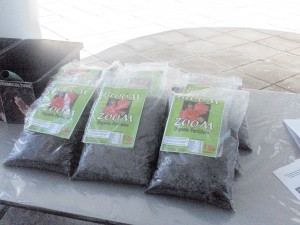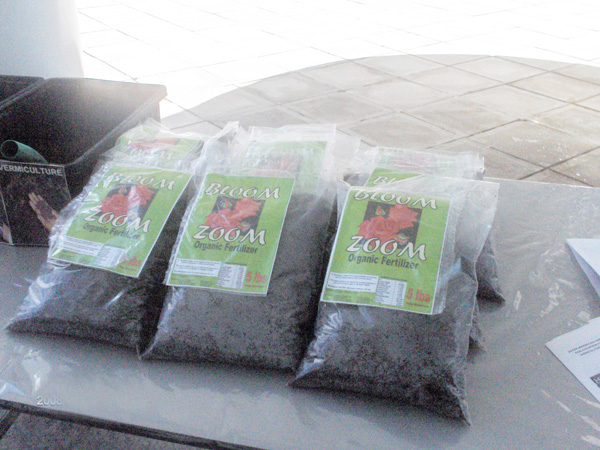By Miranda La Rose
Four Guyanese agri-business enterprises were among some 25 regional projects for which the process of networking on joint ventures and investments have begun following last week’s Regional Agricultural Investment Forum.
Jerlon Pork Products, which produces and processes pork; North West Organics which produces among other things products from crabwood oil and cassava; Cacique Agri Business Inc, sheep rearing and crop production on 5,000 acres of farmland; and the Guyana Citrus Production and Processing company are the businesses identified.
Chief Executive of Jerlon Pork Products, Jermaine London, told Stabroek News that he found the investment forum very useful having made new contacts with similar businesses in Jamaica and Barbados and would be following up with the Inter-American Development Bank (IDB) on available investment options that might be open to him.
Now in his second year in his business, London said he was looking forward to understanding how the swine industry operates in Barbados and Jamaica. He said he was seeking US$1 million to upgrade and to expand.
One of his immediate objectives is to have processed pork on the market for the Christmas holidays. He also plans to start marketing his brand.
London said he had completed a programme in artificial insemination in Jamaica earlier this year and was now preparing to take part in another programme in Jamaica in September, but this time in meat processing.
He told Stabroek News that he had benefited from assistance from the Guyana Office for Investment (Go-Invest) which facilitated and provided access to other agencies and institutions offering funding and technical assistance for capacity building, land at Loo Creek, Linden/Soesdyke Highway, duty-free and tax-free concessions for equipment and machinery, business advice and business services.
Annette Arjoon, of North West Organics told Stabroek News that she was seeking US$350,000 to strengthen the agricultural and eco-tourism capacity of four community-based enterprises in the Shell Beach area in Region One (Barima/Waini). Though the project was not identified for immediate funding, she said, she was “satisfied with the outcome of the forum and I’ve started the ball rolling.”
 She was able to reiterate her point made at a previous meeting in Trinidad and Tobago that Morawhanna, which has port facilities, be made a port of entry for Guyana to trade in fresh garden products with T&T since the area was closer to T&T than Georgetown.
She was able to reiterate her point made at a previous meeting in Trinidad and Tobago that Morawhanna, which has port facilities, be made a port of entry for Guyana to trade in fresh garden products with T&T since the area was closer to T&T than Georgetown.
Noting that T&T Minister of Agriculture Arnold Piggott had highlighted a number of products which the mega-farms project on which it has embarked on, would produce, Arjoon said Mabaruma sub-district which includes the Shell Beach in Region One could immediately start supplying T&T with cassava, coconuts, peppers and pawpaw.
At the investment forum the T&T minister had hinted that some dialogue was underway in this regard but did not elaborate since Guyana’s Minister of Agriculture, Robert Persaud was not at the meeting at the time.
Persaud subsequently told Stabroek News that work was ongoing at Morawhanna to make it a port of entry.
Arjoon, who was one of several business persons who mounted exhibits of their products at the Guyana International Conference Centre where the forum was held, also said that apart from the number of products exhibited, she had laid the groundwork for networking with the Scientific Research Council – an agency of Jamaica’s Ministry of Industry, Technology, Energy and Commerce.
The Guyana Citrus Production and Processing Company was listed a joint venture project to be undertaken in Trinidad and Tobago and Guyana and its objective is to expand citrus production in Guyana. The principal, the Trinidad and Tobago Cooperative Citrus Growers Association/Lu Lu Farms is seeking the sum of US$100,000 for the initial phase to invest in land and production of citrus in Guyana.
Meanwhile, James Moss Solomon, Chairman of the task force that organised the forum, said farmers were paired with who they needed to speak to get guidance and as to how best to prepare their projects for acceptance. Some of the projects were not in form that could have been immediately considered by the investing community, particularly some of the international agencies present.
Guidelines have been given and further would be provided to complete project proposals to seek the appropriate financing, he said.
He added that one of the important things that came out of the forum was that investment did not mean “only borrowing in the Caribbean sense” but that a number of areas, including discussions on the best options available and technical assistance, were also part of the investment. To Moss-Solomon, the conference was relatively successful because it provided opportunities to evaluate the possibilities businesses and investors/bankers now have, with which they could work and develop their projects.








